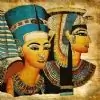Originally posted by: sashashyam
Sandhya my dear,
I came here just for you, and this is the only thread I have read in the last few days, thanks to the state of my eyes.
This is truly a most necessary initiative, and I am delighted that you took the trouble to collate all this. information. You should ask for this thread to be made a sticky one (?) so that it stays on the front page of the forum index, and you should also update it periodically as the individual reforms are, hopefully, covered in the serial One expects that most of them, perhaps bar the financial ones, will be credited to Jodha, but never mind.
Some small additional points. Non-Muslims in the Mughal empire, which meant, in practice, very largely Hindus, had to pay the jaziya. But they were exempted from the zakat Muslims were expected to pay, which could be as high as 2.5% of their capital assets in the previous lunar year.
It would be interesting if you or someone else could find out the relative rates for the jaziya (which was compulsory) and the supposedly voluntary zakat.
Of course the loss to the exchequer because of the jaziya abolition would have been heavy, as the majority of the population would have been covered under the jaziya every year, whereas the pilgrimage tax was only for the non-Muslim pilgrims. In the film, they showed the Hindu Revenue Minister, Raja Todar Mal, initially reluctant to remove the jaziya as it would have made such a dent in his revenues for any given year!
Akbar's widow remarriage reform would have been only for non-Muslims, as there was never any problem for Muslim widows.Anyhow, the reform was forgotten some time later as the Mughal empire decayed, and had to be revived, lobbied for, and renacted in the 19th century, at the initiative of Raja Ram Mohan Roy and his fellow campaigners.
It was the same with the Sati abolition, I did not know that Akbar had tried to remove it; I was very pleased to learn that.
That was one issue with which Jodha might not have bothered too much, for though it was far from being the norm even for medieval queens - in the Mahabharata, only Madri, the mother of Nakul and Sahadev, commits Sati when Pandu dies, not Kunti - it was seen, like the sister custom of jauhar, as a badge of honour for the women and for the families. In fact The Sati custom was most prevalent only in Rajasthan and West Bengal till the early 19th century. It was unknown in South India. Over time, of course, it degenerated from a voluntary demonstration of a wife's love for her husband, and her courage, into an ugly tradition forced on the widows for purely mercenary reasons linked to the family property. It was Ram Mohan Roy and his ilk who persuaded the reluctant Gov. General William Bentinck to abolish Sati by law; the British feared a popular uprising that they did not want to have to tackle. In the event, there was no such violent reaction, for the time for the abolition of Sati had come.
As for slavery, his real problem would have been in enforcing it across such a vast empire. As I had written yesterday on my last thread, there were flourishing public slave markets in the southern United States till slavery was abolished in 1865.
If one takes even a cursory look at the book, Gone with the Wind, one will understand that.
Africans were sold by their chiefs in Africa, brought to New Orleans in overloaded cargo vessels in chains. Many died in transit and were written off as bad lots.
Then they were put on public display and auctioned. The old Slave Market in New Orleans is now a ghoulish tourist spot. Families were very often split apart at these sales. In the GWTW book, Gerald O'Hara's wife persuades him to buy the wife and daughter of a male slave he has bought, so that the family could be together.
Great Britain abolished slavery in its colonies only in 1839. Till then, most of the great English fortunes were based on slave labour in the West Indian and African plantations. As for the atrocities perpetrated in the Belgian Congo, which was the personal property of King Leopold II, till the late 19th century, are concerned, even a brief account of them would turn your stomach.
So the kind of 16th century slave markets, at which the prisoners of war were sold, which were shown on Saturday, are nothing new, or peculiar to Mughal India. The only thing is that the slaves would not have been kept starved and thirsty, if only because they would not sell well if they looked so bedraggled. Plus, no one would have carted old women along, they would not have been worth anything.
Akbar was clearly one of the greatest administrative, financial and social reformers of all time. That he could achieve all that he did without being able to read and write magnifies the brilliance of the man, his grasp of detail, the breadth of his social vision, and his iron will. One can be sure that Akbar would not have wasted a week acting as the Election Commissioner for choosing his Harem Superintendent!😉
The only one comparable to Akbar for the sheer range and complexity, and the seminal importance of his reforms was Napoleon, who had the disadvantage of having ruled only for 20 years - as against 50 years for Akbar - as the First Consul and then as the Emperor of France, and that too constantly having to fight wars against his European enemies. Still, he found time to enact the Code Napoleon, which lasted till the 20th century with changes and is still the basis of the legal systems of France and many European countries.
Shyamala Aunty
PS: Why does Jalal say in the Saturday mahaepisode that the concept of dying bravely in battle being considered an honourable death was not prevalent among Mughals? I could not understand it at all.




































366